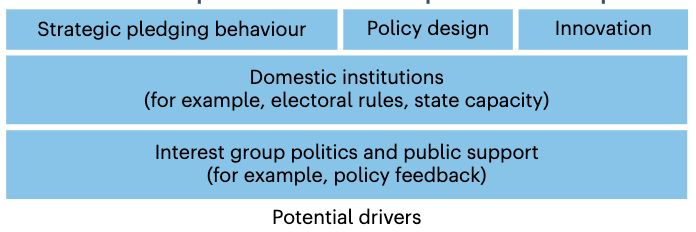🙋
29.07.2023 20:25 — 👍 1 🔁 0 💬 0 📌 0Taryn Fransen
@tarynfransen.bsky.social
I study climate policy + politics at World Resources Institute + UC Berkeley
@tarynfransen.bsky.social
I study climate policy + politics at World Resources Institute + UC Berkeley
🙋
29.07.2023 20:25 — 👍 1 🔁 0 💬 0 📌 0In any case, the Global Stocktake should encourage governments and advocates to take a cold, hard look at the political factors that are keeping them from delivering on their commitments, and prioritize their reform. 15/
29.07.2023 20:14 — 👍 0 🔁 0 💬 0 📌 0But the failure of developed countries to deliver on their finance pledges (subject to many of these same drivers, no doubt) plays an important role in the implementation gap for conditional pledges. 14/
29.07.2023 20:14 — 👍 1 🔁 1 💬 1 📌 0It also bears mentioning that we focused primarily on unconditional pledges, and therefore did not go deep on the role of international finance. 13/
29.07.2023 20:13 — 👍 0 🔁 0 💬 1 📌 0On the other hand, the impacts of some key IRA provisions aren't even included in modeled emissions reductions - not because they won't reduce emissions, but because it's not possible to model by how much - which would work to close any outcome gap 12/
29.07.2023 20:12 — 👍 0 🔁 0 💬 1 📌 0On the one hand, @jessejenkins.bsky.social finds that over 80% of IRA's GHG reduction potential will be lost if we can't speed up transmission expansion, leading to a potentially huge outcome gap 11/
29.07.2023 20:12 — 👍 0 🔁 0 💬 1 📌 0To illustrate the policy outcomes gap - where policies in practice deliver something different than what models project - take the US Inflation Reduction Act 10/
29.07.2023 20:11 — 👍 0 🔁 0 💬 1 📌 0In principle, countries with strong policies but weak outcomes (i.e. the lower right) may be experiencing a policy outcome gap (though I'll admit that some of these scores raise some questions for me) 9/
29.07.2023 20:11 — 👍 0 🔁 0 💬 1 📌 0
The policy outcome gap can only be measured post hoc, but we used data from the Climate Change Performance Index https://ccpi.org to map perceived domestic policy strength against lagged policy outcomes 8/
29.07.2023 20:11 — 👍 0 🔁 0 💬 1 📌 0Clearly pledging behavior explains some of the policy adoption gap - if you make a less ambitious pledge - you'll have less of a gap - but not all of it 7/
29.07.2023 20:10 — 👍 0 🔁 0 💬 1 📌 0
The policy adoption gap varies widely across countries, illustrated here using data from Climate Action Tracker. (+ means country's pledge is way more ambitious than their policies, - means vice versa). 6/
29.07.2023 20:10 — 👍 1 🔁 0 💬 1 📌 0
and that these gaps are a function of strategic pledging behavior, policy design, innovation, domestic institutions (e.g. electoral rules, state capacity) and interest group politics and public support (e.g. policy feedback) 5/
29.07.2023 20:10 — 👍 0 🔁 0 💬 1 📌 0We argue that the implementation gap can be further decomposed into a "policy adoption gap" (the difference between countries' pledges and the policies they adopt) and a "policy outcome gap" (the difference between expected policy outcomes and actual policy outcomes) 4/
29.07.2023 20:09 — 👍 0 🔁 0 💬 1 📌 0
The emissions gap is the sum of the "ambition gap" (gap between emissions for 1.5°C and emissions under national pledges, or targets) and the "implementation gap" - the gap between national targets and national policies 3/
29.07.2023 20:09 — 👍 1 🔁 0 💬 1 📌 0
First, some definitions: The emissions gap is the difference between future global emissions in 1.5°C scenarios, and what future global emissions actually turn out to be. This gap is tracked every year by UNEP Emissions Gap Report colleagues https://unep.org/resources/emissions-gap-report-2022… 2/
29.07.2023 20:09 — 👍 2 🔁 2 💬 1 📌 1
You've heard of the emissions gap, but what about the implementation gap? Our new comment in Nature Climate Change unpacks why countries don't deliver on their #climate pledges - a critical question for the Global Stocktake. https://rdcu.be/dhUk5 1/
29.07.2023 20:02 — 👍 29 🔁 9 💬 3 📌 1